sx blog
Our digital space for brief commentary and reflection on cultural, political, and intellectual events. We feature supplementary materials that enhance the content of our multiple platforms.
Walter Rodney and How Europe Underdeveloped Africa, Fifty Years Later: A Small Axe Workshop, 10-11 March 2023
Walter Rodney and How Europe Underdeveloped Africa, Fifty Years Later: A Small Axe Workshop, 10-11 March 2023
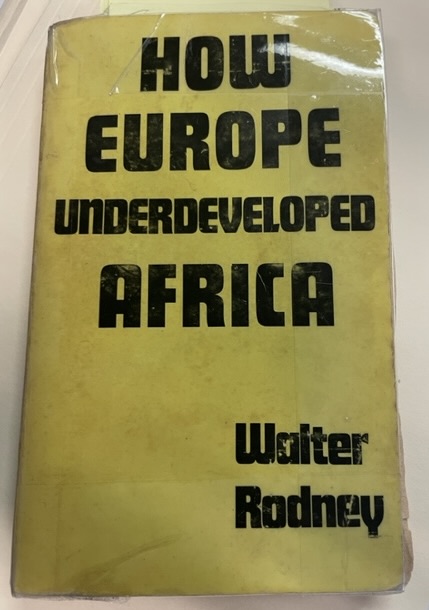
Walter Rodney's landmark book, How Europe Underdeveloped Africa was first published in 1972. Even as it was published it was recognized as a major intervention into debates about African history, Caribbean history, and anticolonial and Pan-African critiques. Fifty years later, the question is: How should it now be read? This 2-day workshop brought together 9 scholars to think together about the contemporary relevance of Rodney's book (and his larger body of work): Richard Drayton, Alissa Trotz, Nigel Westmaas, Natasha Shivji, Adom Getachew, David Austin, Peter Hudson, Michaeline Critchlow, and David Scott. The revised essays will appear in Small Axe 72 (November 2023).
'Copresence' Before the Archive
Tyler Grand Pre
'Copresence' Before the Archive
Tyler Grand Pre
Detail from “Tableau historique de la Martinique: composé pour l'Impératrice Joséphine par l’abbé Nicolas Halma.” 1805-1809. Bibliothèque nationale de France
“Encore une objection ! une seule, mais de grâce une seule : je n'ai pas le droit de calculer la vie à mon empan fuligineux ; de me réduire à ce petit rien ellipsoïdal qui tremble à quatre doigts au-dessus de la ligne, moi homme, d'ainsi bouleverser la création, que je me comprenne entre latitude et longitude !”
– Aimé Césaire, Cahier d’un retour au pays natal
While examining Césaire’s poetic shifts in pronouns and subject positions in my recently published article “Inflecting the French” – from a pronounless search for meaning outside of colonial discourse, to a tenuous “we” of shared ancestry and personal memory, to an intersubjective melting in the indefinite pronoun “on” – I was struck by the way this poetics of intersubjectivity relies on a subtle cartographic conceit openly addressed in the epigraph above: “One more thing! Only one, but please make it only one: I have no right to measure life by my sooty finger span; to reduce myself this little ellipsoidal nothing that trembles four fingers above the line, I a man, to so overturn creation that I include myself between latitude and longitude”(Notebook 14). By approaching Martinique (the people and the island) as the thingified assemblage of “this ellipsoidal nothing” – describing the island's appearance on a world map – the poetic speaker’s objection to being measured within the colonial metrics of a figural map parallels his poetic refusal to transcend his colonial reality through the universal pretenses of the lyric “I.” As I argue in my essay, Césaire instead discursively remaps the Antilles through the speaker’s deconstructive approach to his native land in an “I/it” as opposed to “I/you” relationship. And so, not unlike the “unruly contours” that make “things fidget” on Kei Miller’s island in “What the Mapmaker Ought to Know,” Césaire’s poetics of intersubjectivity cause the island to tremble on the map and tongue in ways that my brief summary here can only preview (Miller 15).
However, I would like to briefly engage some of the archival work I did while preparing to present on the essay at the 2021 Graduate edition of the Brown University Political Concepts Conference. With Césaire’s objection as my model, I searched the digital collections at the Bibliothèque Nationale de France (BNF) as well as the archives at the École Normale Supérieure (ENS) at first trying to imagine what maps or atlases he might have encountered before writing what would become the first version of the Cahier published in 1939 (Césaire, Poésie, 37). But gradually I found myself not searching so much for a particular document as much as a kind of document that speaks to that symbolic refusal to be reduced to colonial representation.
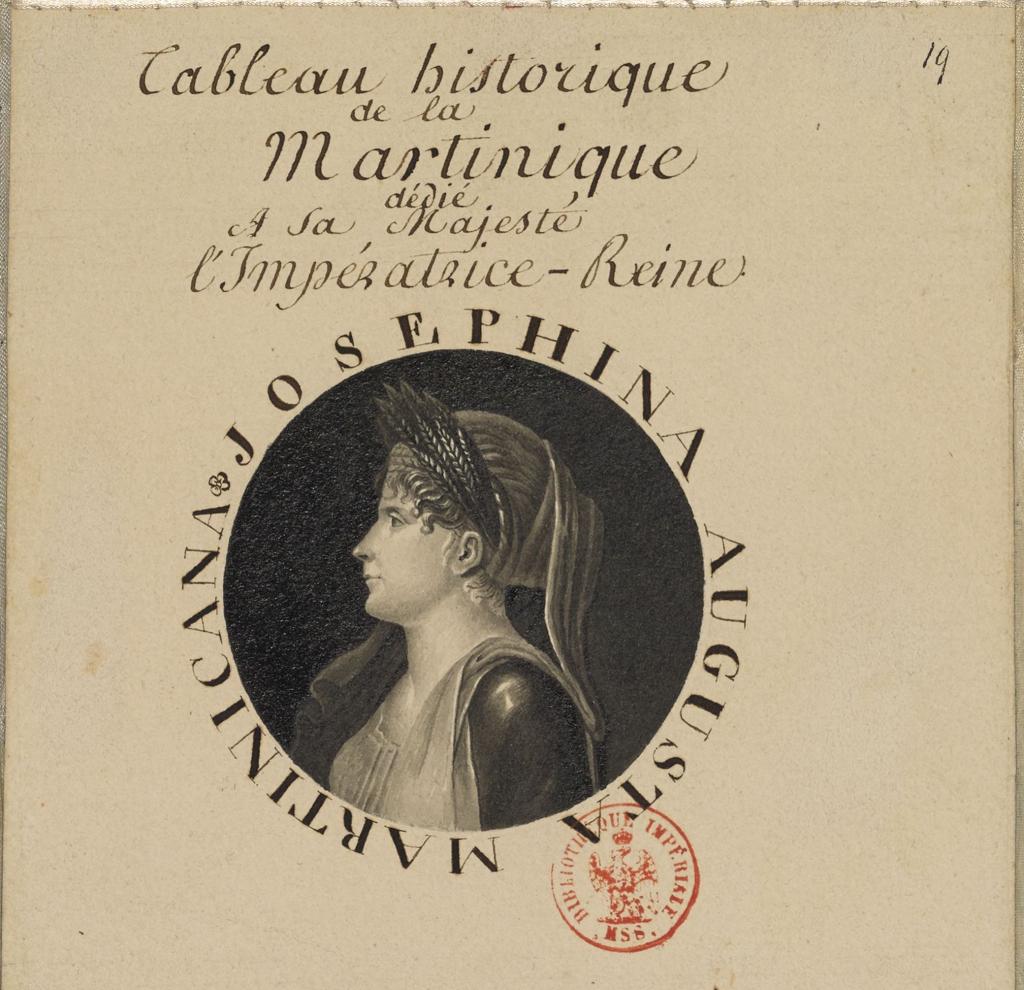
Detail from “Tableau historique de la Martinique: composé pour l'Impératrice Joséphine par l’abbé Nicolas Halma.” 1805-1809. Bibliothèque Nationale de France
What I found was a “Tableau historique de la Martinique” made specifically for Empress Joséphine by l’abbé Nicolas Halma, the librarian at Malmaison charged with educating the empress in history and geography. It was produced as a part of a series of “tableaux historiques et chronologiques” containing historical accounts of French territories and reproductions of maps and illustrations from a variety of famous works available at the time. What stood out to me at first was the way this tableau almost perfectly captures the sweeping, particularizing movement in the opening lines of Césaire’s poem from “the hungry Antilles, the Antilles, the Antilles pitted with smallpox, the Antilles dynamited by alcohol...” (Césaire, Notebook, 1),
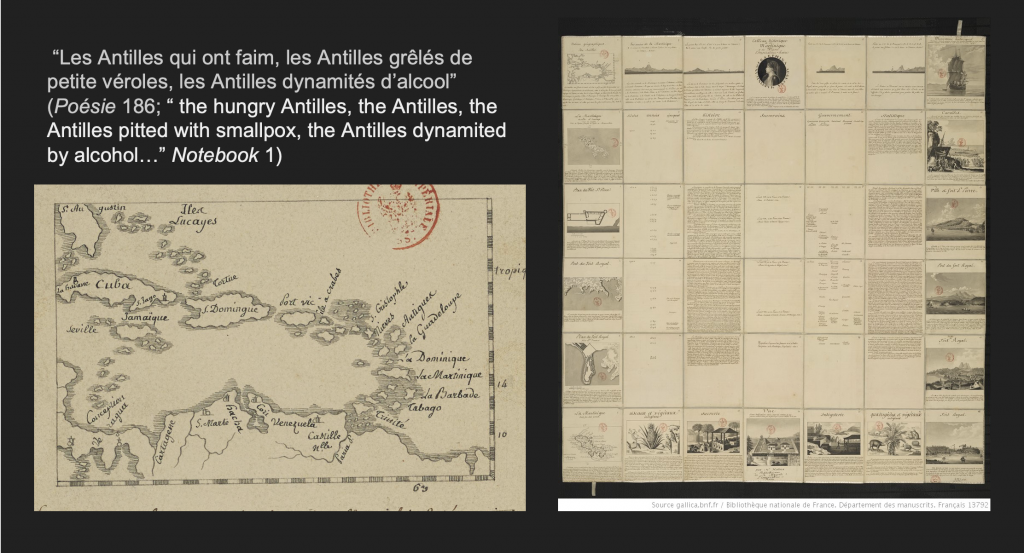
Screenshot from the presentation “Elliptical Ontology: The Geometry of Blood and the Grammar of Dispossession,” presented at the 2021 Political Concepts: Graduate Student Edition conference, which was published on Youtube by the conference organizers
to “this town sprawled-flat, toppled,” to “this squalling throng so astonishingly detoured from its cry as this town has been from its movement, from its meaning, not even worried, detoured from its true cry, the only cry one [on] would have wanted to hear because it [on] alone feels at home in this town; because one [on] feels that it inhabits some deep refuge of shadow and of pride in this town” (Poésie 186; Notebook 2-3).
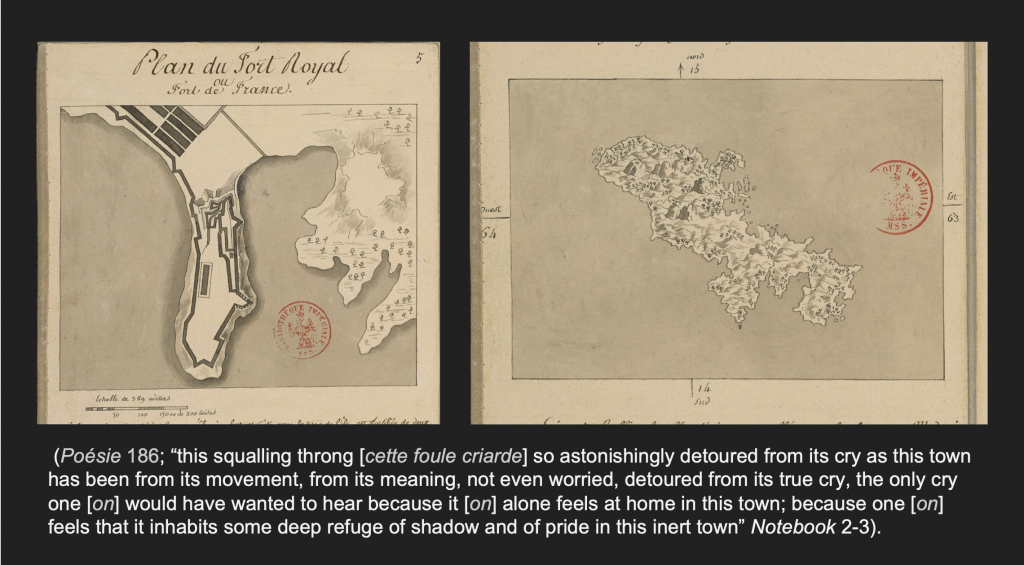
Screenshot from the presentation “Elliptical Ontology: The Geometry of Blood and the Grammar of Dispossession,” presented at the 2021 Political Concepts: Graduate Student Edition conference, which was published on Youtube by the conference organizers
I insert some of the French in the last quote to highlight the way Césaire inflects the lyric tradition with the intersubjective valences of negritude through a poetic use of the indefinite pronoun "on" (which can, depending on the context and intention of the speaker, speak to any of the other personal pronouns). As I note in a section of the essay entitled “The Fugitive Grammar of Intersubjectivity,” “Because Martinique as it exists on a map is conflated with the affective representations of the black community as it exists in Enlightenment discourse, the use of on [...] affords the speaker a kind of grammatical camouflage in his movement about the geo-discursive spaces of the island and traversal of the [...] cartographically framed divide between him and ‘cette ville’” (Grand Pre 413).
Going beyond the scope of my published essay and presentation – for which these maps started off as just an illustration – I noticed the way the indefinite pronoun "on" functions in the Tableau’s description of “Indigoterie” (the site and tools of Indigo processing) as a subjective meeting place for the overseer’s disciplining eye/ hand and the enslaved bodies doing the labor. Both that grammatical bridge across that cartesian divide and its visual representation tremble a lot like the grammar of Césaire’s map when one considers a part of the original text to “Indigoterie” in Jean Baptiste du Tertre’s Histoire générale des Antilles (1667-71) omitted by l’abbé Halma. In particular, Halma leaves out the section where Du Tertre asserts the importance of making the cisterns in which the most chemically hazardous part of the Indigo processing is conducted out of stone and cement since making it out of wood had resulted in the deaths “des François & des Négres” (of French and Blacks) (Du Tertre, 110).
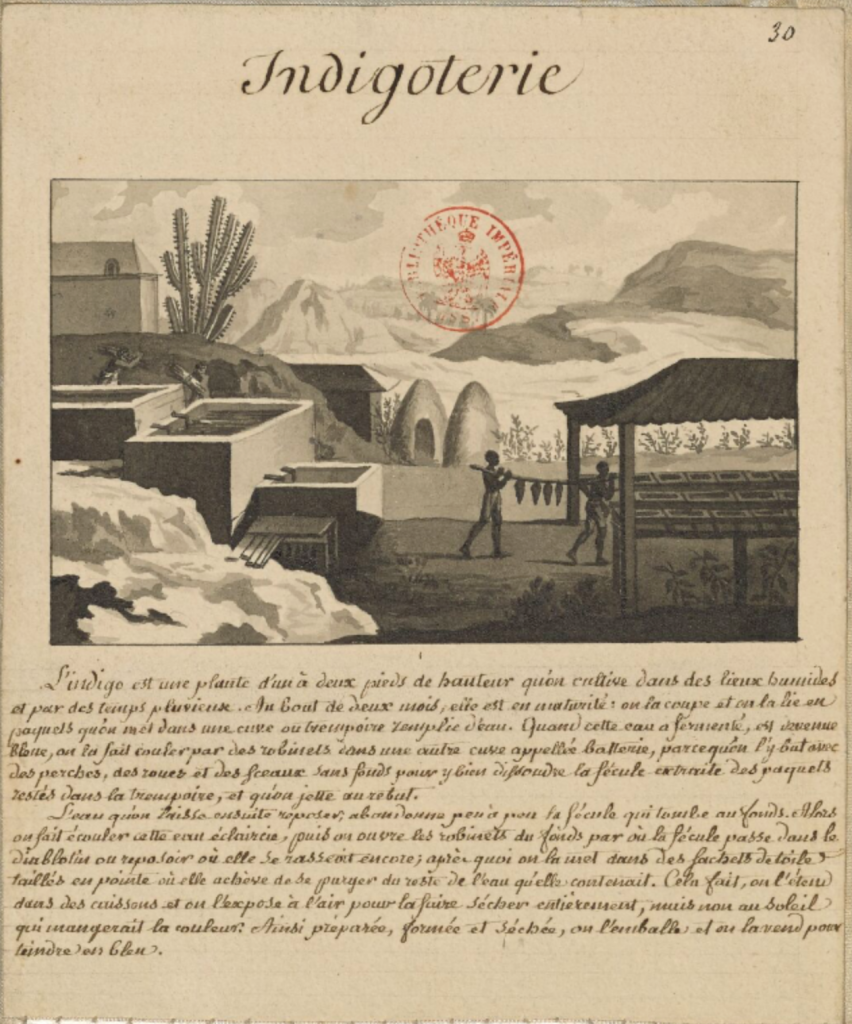
Detail from “Tableau historique de la Martinique: composé pour l'Impératrice Joséphine par l’abbé Nicolas Halma.” 1805-1809. Bibliothèque nationale de France
The plantocratic fantasy of harmonious relations of slavery under constant surveillance – signified as the pronoun “on” and visualized through the vantage point of this illustration as well as the inclusion of an overseer in the original – is at odds with the reality that most certainly led planters to abandon their enslaved to the noxious fumes of the indigo plantation built with improper materials to maximize profit. Not only is it that black overseers were used to maintain discipline and order, but these reflections invite us to read into where there were unsurveilled locations for black resistance, creativity, and life within the necropolitics of the plantation. Thus “on” not only signals an unsettled cartesian divide between the “[les] François & [les] Nègres,” but it provides an ethical site of counter-historical reading – a site that registers with Saidiya Hartman’s impulse to read beyond “the surface of discourse” that buries racialized subjects within the archive of their “encounter with Power” (Hartman 2).
Reading with Césaire, or Hartman for that matter, I experienced a kind of ‘copresence,’ to adapt the concept of one of my fellow presenters at the Brown conference – and this copresence before the archive stuck with me while doing some archival work in Martinique this past winter break. Standing on the edge of La Savane facing what is left of the statue of l’Impératrice Joséphine – the privileged subject of the Tableau – I found myself thinking of Césaire’s symbolic map, its representational excesses, and recited under my breath his address to “those who never invented anything.”
As an older Martinican man reminded me while chatting about the history of the cracked, graffiti-ridden marble, this statue had trembled for years with the legacy of the plantation and the socio-political hierarchies of an island whose industry is still run by the békés (the descendants of the slaver planter class). Erected in 1859 as a part of the Second Empire’s wave of Bonapartist monuments, the statue towered as a symbol of the Old Martinique over the so-called nouveaux libres forced to work on the old plantations by post-emancipation vagrancy laws (Brown 43). Considering the way the statue looked towards the plantation of La Pagerie in Les Trois Îlets, it is not surprising Joséphine’s likeness continued to evoke the story that she had convinced Napoleon to reinstitute slavery in the French colonies in 1802.
From the throwing of red paint to the beheading of Joséphine’s statue in the 1990s, such a legacy invited repeated vandalism that finally led to the statue being torn down completely in the summer of 2020. This was another kind of copresence that took place amidst the global response to George Floyd’s murder as well as the controversy around Macron’s decree that no monuments would be removed in French territories – racist or not. Like the Duke of Orleans’ statue removed by the French at the moment of Algerian independence, all that remains of Josephine is an empty pedestal. Whatever may be the next mark or gesture for this palimpsest of protest, for the moment, it trembles as a monument to popular memory.
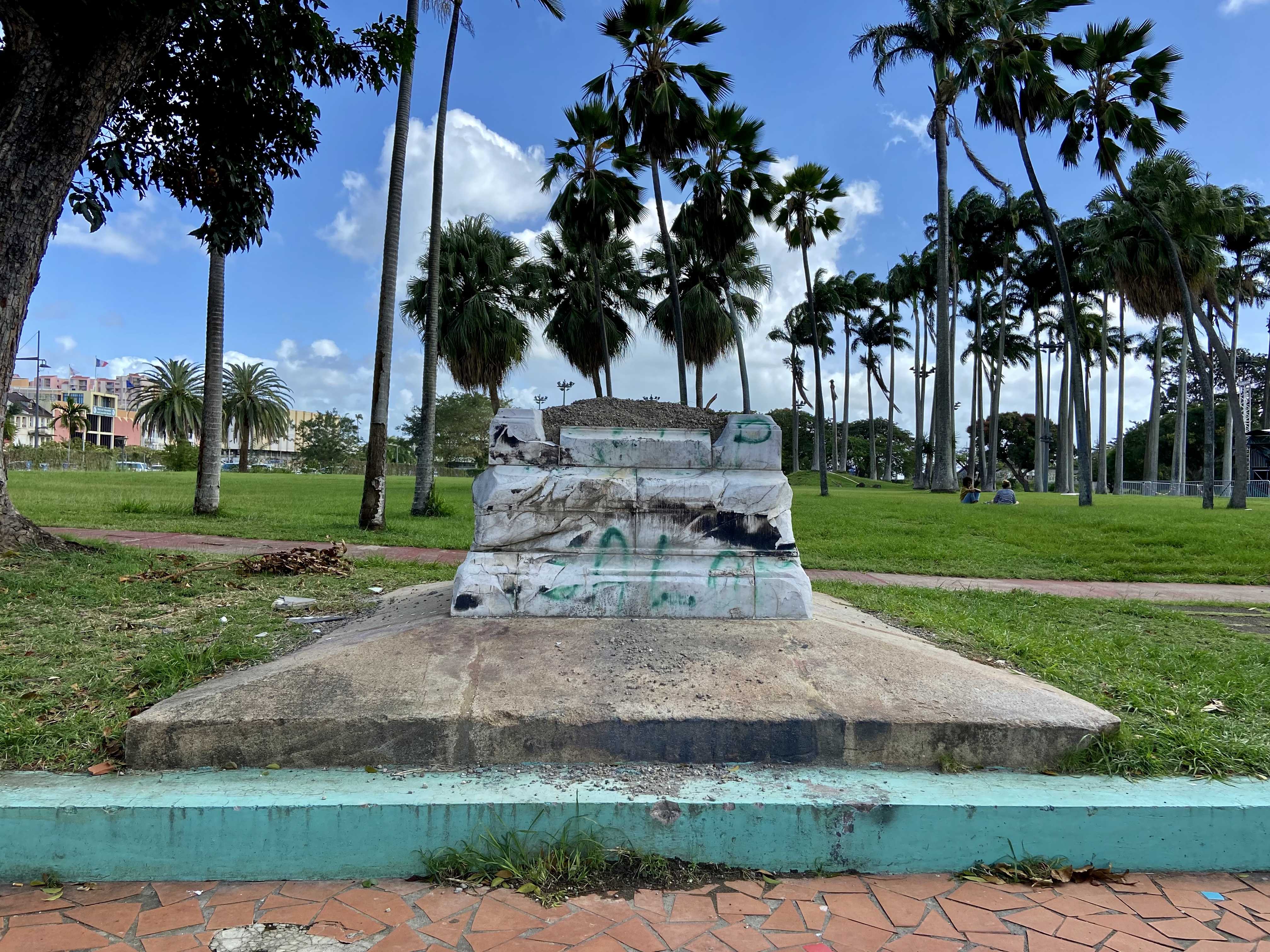
Photo of the statue of L’impératrice Joséphine, Credit. Photo by Tyler Grand Pre, 2023. Copyright Tyler Grand Pre. All Rights Reserved
References
Brown, Laurence. “Créole Bonapartism and Post-Emancipation Society : Martinique's Monument to the Empress Joséphine.” Outre-mers 93, no. 350 (2006): 39–49. https://doi.org/10.3406/outre.2006.4188.
Césaire, Aimé. Notebook of a Return to the Native Land. Translated and edited by Clayton Eshleman and Annette Smith. Wesleyan University Press, 2001.
—. Poésie, théâtre, essais et discours. Edited by A. James Arnold. Paris: CNRS : Présence Africaine, c2013.
Du Tertre, Jean Baptiste. Histoire generale des Antilles habitée par les François. Paris: T. Iolly, 1667-71.
Edwards, Brent Hayes. “The Taste of the Archive.” Callaloo 35, no. 4 (2012): 944–72. https://doi.org/10.1353/cal.2013.0002.
“Elliptical Ontology: The Geometry of Blood and the Grammar of Dispossession,” presented at the 2021 Political Concepts: Graduate Student Edition conference.
Frempong, Deborah. “Copresence.” “Political Concepts: Graduate Student” Edition (2021). https://sites.brown.edu/political-concepts-spring21/speakers/deborah-fr…
Halma, Nicolas B. “Tableau historique de la Martinique: composé pour l'Impératrice Joséphine par l’abbé Nicolas Halma.” 1805-1809. Bibliothèque nationale de France. Département des manuscrits, ark:/12148/btv1b52507384.
Hartman, Saidiya. “Venus in Two Acts.” Small Axe: A Caribbean Journal of Criticism 12, no. 2 (2008): 1–14. https://doi.org/10.1215/-12-2-1.
Miller, Kei. The Cartographer Tries to Map a Way to Zion. Carcanet, 2014.
Vial, Charles-Éloi. « Joséphine et les leçons d’histoire de Malmaison », Revue de la BNF, vol. 53, no. 2, 2016, pp. 173-184.
Register for Keywords in Caribbean Studies Conversation
Zwart, Nègre, Negro/a/x*, Black
Register for Keywords in Caribbean Studies Conversation
Zwart, Nègre, Negro/a/x*, Black
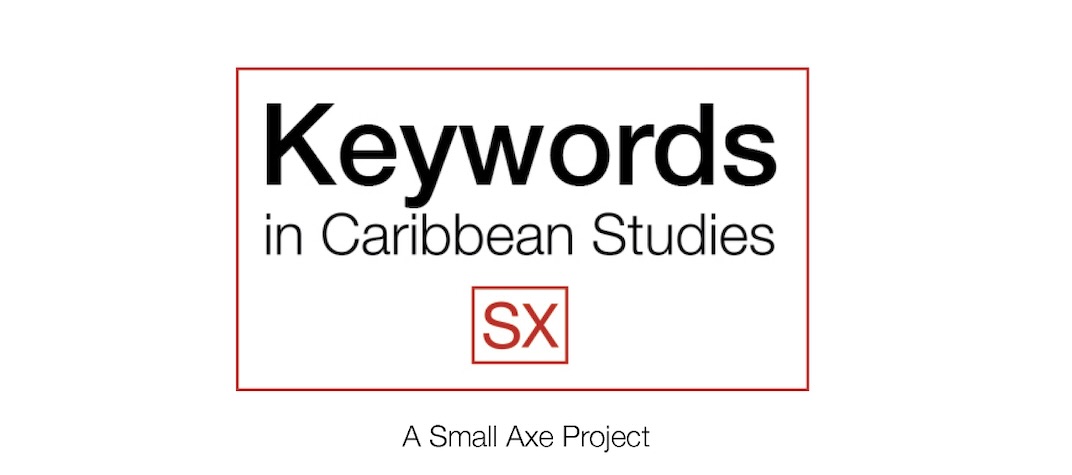
Join us for a virtual conversation with
Gregory Pierrot
Gloria Wekker
Leniqueca A. Welcome
Omaris Z. Zamora
Moderated by Ryan Cecil Jobson and Vanessa Pérez-Rosario
Date: Thursday, 2 March 2020
Time: 6:30 pm-8:00 pm EST
RSVP: https://tinyurl.com/sxkeyword
In Small Axe 68, July 2022, we launched our Keywords in Caribbean Studies project. We began with Zwart, Negro/a/x*, Nègre, and Black. Few words in Caribbean discourse (popular or scholarly) have the multiplicity of meaning and fraught history of these.
Join us for a conversation with the contributors to the inaugural iteration of the Keywords project.
Read more about our keywords project here: http://smallaxe.net/sx/issues/68
Contact: Vanessa Pérez-Rosario, vpr@smallaxe.net
Co-sponsored by Sou Sou: UChicago Humanities Laboratory in Caribbean Studies
The Loss of Gordon Rohlehr (1942-2023)
The Loss of Gordon Rohlehr (1942-2023)
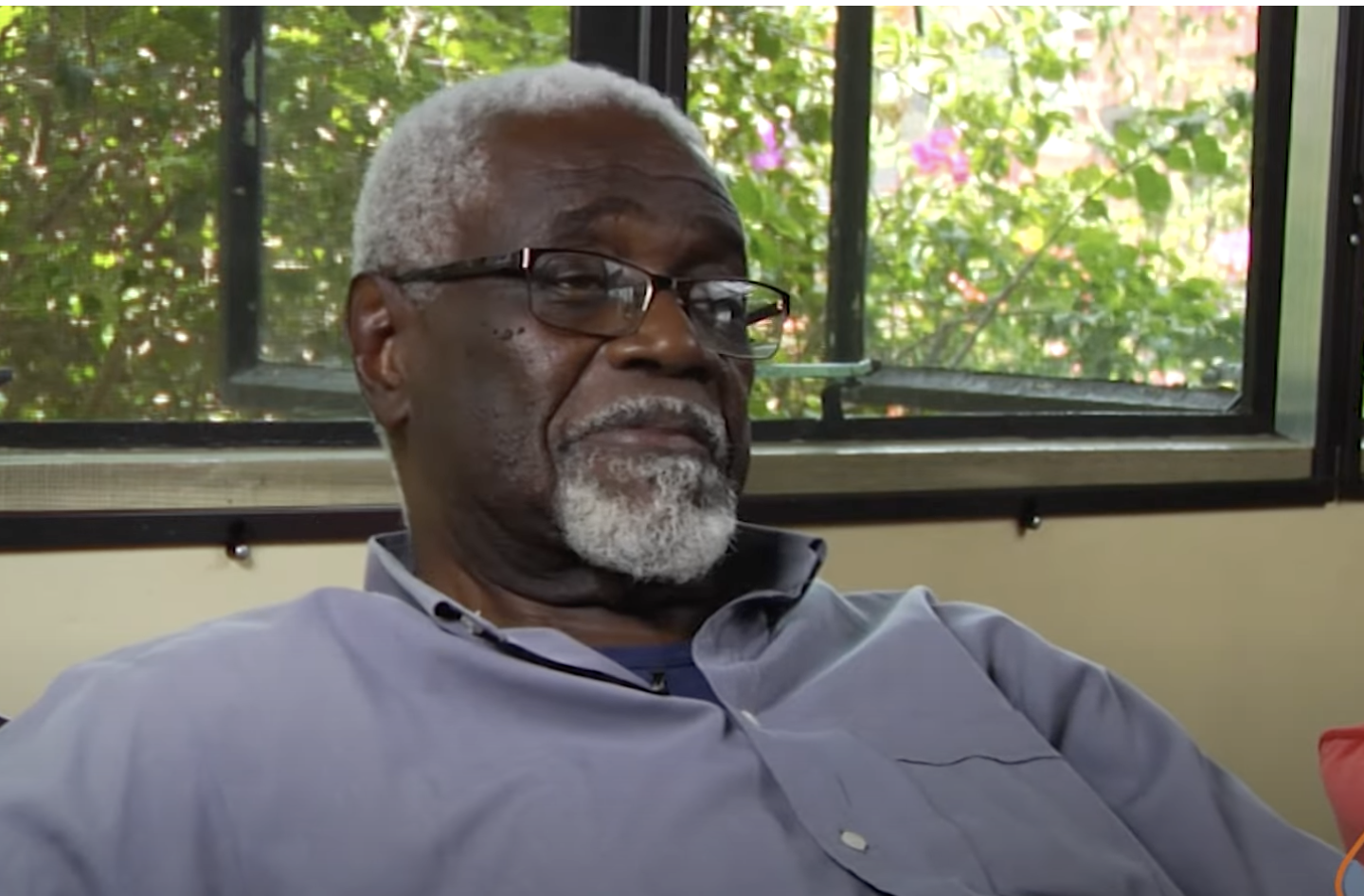
We in the Small Axe Project join the wider Caribbean intellectual community in mourning the loss of Gordon Rohlehr (1942-2023). He was a towering figure, and unforgettable: a literary-cultural critic of unrivaled attunement, with an unerring sense for the sounds and rhythms of Caribbean popular practices, and a seemingly inexhaustible archive of Caribbean literary history. "Man gone," as he put it, signing off on a "bookman's" lifetime of intellectual work.
Read Rohlehr's recent contribution to small axe, "A Literary Friendship: Selected Notes on the Correspondence with Kamau Brathwaite," made freely available here.
Screenshot of Professor Gordon Rohlehr taken from the YouTube video entitled ‘Professor Gordon Rohlehr (1942-2023)’ by Visual Art and Production.
Congratulations to Our Editorial Assistant Dantaé Elliott!
Congratulations to Our Editorial Assistant Dantaé Elliott!

SX is excited to congratulate sx editorial assistant Dantaé Elliott on being named the Spring 2023 Hemispheric Institute Mellon Fellow at New York University!
As part of her residency as a Hemi Mellon Predoctoral Fellow, Dantaé Elliott will curate the upcoming exhibition of Hemi Artist in Residence Nadia Huggins, which will open at the King Juan Carlos I Center in April 2023. The exhibition will showcase current works by Nadia Huggins that encompass her approach to representing Caribbean Landscapes and the sea. This immersive exhibition moves from the sea towards the land to reimagine evolving species (Human/non-human) and their experiences in a changing environment caused by man-made and natural catastrophes.
Read more about Dantaé and her project here.
Small Axe 69 is now available!
Small Axe 69 is now available!
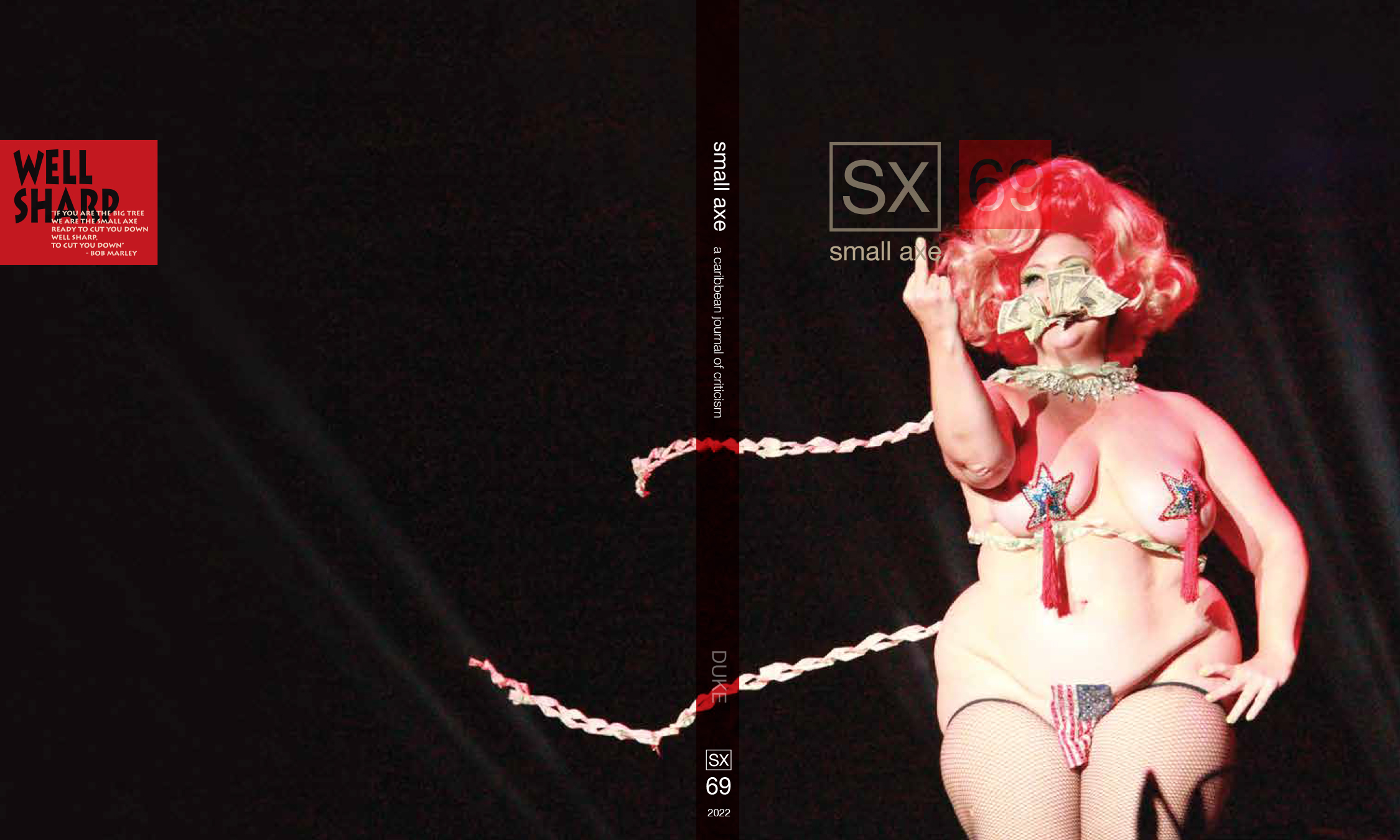
Small Axe 69 opens with David Scott's preface, "The Last West Indian," in memory of George Lamming. This issue includes essays by Grace L. Sanders Johnson, Audra Diptée, Ben Etherington and Natalie Catasús. Julio Ramos guest edits our special section, "The Legacies of Luisa Capetillo," which marks the centenary of the Puerto Rican radical feminist's death, with contributions by Nancy Bird-Soto, Luis Othoniel Rosa, Beatriz Llenín-Figueroa and Jorrell A. Meléndez-Badillo. Work by Puerto Rican photographer Luis Carle is featured on the cover and in this issue's visual essay, "Dirty Martini Delivers Gender Justice." Puerto Rican poet and translator, Raquel Salas Rivera asks "How Do You Translate Compaña?" for our Translating the Caribbean project. Randi Gill-Sadler and Belinda Deneen Wallace discuss Laurie Lambert's Comrade Sister: Caribbean Feminist Revisions of the Grenada Revolution.
We invite you to engage the performance art published in our blog, sx live titled, “Luisa Capetillo, cuchillo en boca" (Luisa Capetillo, Knife Between Her Teeth) by Teresa Hernández.
Luisa Capetillo, cuchillo en boca
Teresa Hernández
Luisa Capetillo, cuchillo en boca
Teresa Hernández
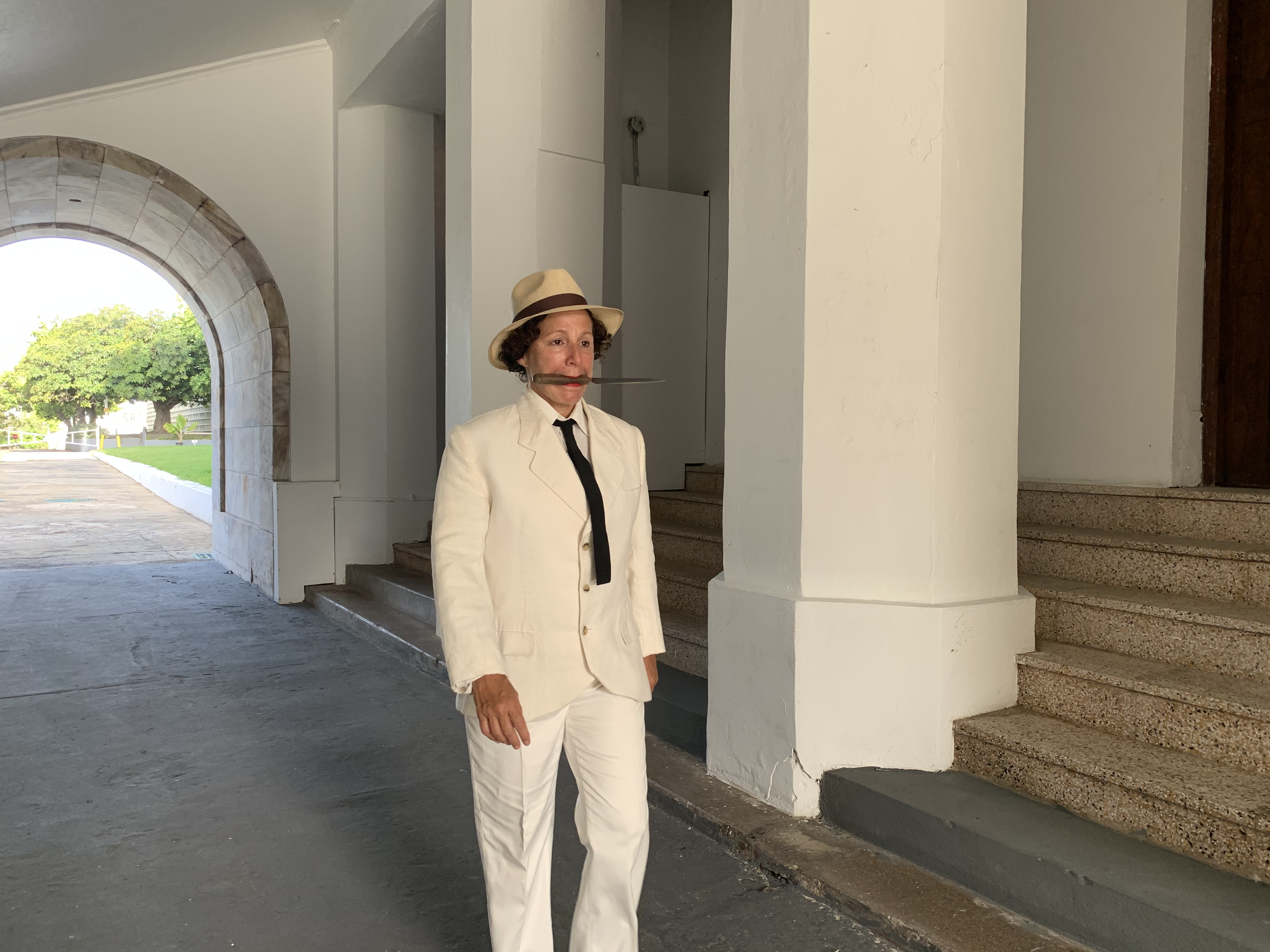
Cover image: Walking Luisa. Capitolio. South Wing, San Juan. Photo by Marisol Plard Narváez. July-August 2021. Copyright Teresa Hernández and Marisol Plard Narváez. All rights reserved.
Small Axe 69, November 2022 features a special section dedicated to the memory of Luisa Capetillo, the radical Puerto Rican feminist, anarchist, organizer, and writer. The special section, titled “The Legacies of Luisa Capetillo” is guest-edited by Julio Ramos, and marks the centenary of her death in 1922. In anticipation of the publication of our November issue, we invite you to engage the performance piece published here in sx live titled, “Luisa Capetillo, cuchillo en boca" (Luisa Capetillo, Knife Between Her Teeth) by Teresa Hernández. You’ll find a recording of the performance piece, an accompanying text titled “On Luisa Capetillo, cuchillo en boca: a Cleansing and a Prophecy” (in English and in Spanish) by Beatriz Llenín-Figueroa, and supplementary still images.
In a ritual of resistance and not mourning, as the final shot of the performance tells us, Puerto Rican performance artist Teresa Hernández embodies the presence of Capetillo in her hometown 100 years after her untimely death—dressing in the syndicalist feminist’s iconic beige suit and black tie, reading from the journalist’s writings, and walking around a “ruinous building” in Capetillo’s hometown of Arecibo followed by members of the public as well as “anonymous women” (played by Beatriz Llenín-Figueroa and Teresa Peña Jordán) all with a knife between their teeth. The performance thus speaks to Beatriz Llenín-Figueroa’s contribution to sx 69 entitled “Walking Duermevelas with Luisa” where they read/write about an archive of US and Puerto Rican newspapers from the subject position(s) of “Luisa-I-we” and walk “in the crevices of a historical montage that is always now, in a convulsive state of perpetual alertness—which bodies against patriarchy cannot not be in—where dreaming is haphazard yet desired, where nos velamos mutuamente mientras nos velan (we watch over each other while we are being watched), where we are both at once, dead and alive, where walking is both an everyday and a fiercely charged political act” (100-101).
Luisa Capetillo, Knife Between Her Teeth
Teresa Hernández
Luisa Capetillo, cuchillo en boca (Luisa Capetillo, Knife Between Her Teeth) is a performance piece by Teresa Hernández (with Beatriz Llenín Figueroa and Teresa Peña Jordán) that took place on April 30, 2022 at the Instituto del Karso de Puerto Rico y el Caribe (Karst Institute of Puerto Rico and the Caribbean), located in Arecibo, the Puerto Rican city where Capetillo was born. The piece was performed at the invitation of Editora Educación Emergente (EEE) as part of events commemorating the centenary of Luisa Capetillo's death (1882-1922), and in celebration of the new edition of the book Amor y anarquía: escritos de Luisa Capetillo (ed. and intro. Julio Ramos, EEE, 2021).
Credits
Luisa Capetillo: Teresa Hernández
Women with knives between their teeth: Beatriz Llenín Figueroa and Teresa Peña Jordán
Production assistant on location: Antonio “Toño” Ramos Vega
Cameras: Julio Ramos and Tatiana Rojas
Editor: Martín Yernazian
Book and promotional art: Zuleira Soto Román
Luisa Capetillo's costume: Vilma Martínez
Producer: Julio Ramos
On Luisa Capetillo, cuchillo en boca: a Cleansing and a Prophecy
Beatriz Llenín-Figueroa
An iconic costume: Luisa Capetillo’s linen pantsuit, skinny tie, and Panama hat.
An iconic action: walking.
An iconic image: mujer con el cuchillo en la boca (woman with the knife between her teeth).
An iconic word: that of Luisa Capetillo.
And the Puerto Rican transdisciplinary scenic artist, Teresa Hernández.
Such were the seeds of the performance piece, Luisa Capetillo, cuchillo en boca, which Teresa and I had shared in exultant anticipation. We have been in dialogue and collaboration for some time now around common concerns, passions, obsessions, desires, dreads: Puerto Rican and Caribbean becoming in the age of climate crisis, rising sea levels, and coastal (and other) erosions and dispossessions; gender violence and the persistent abuse against women’s and femme bodies, memories, (re)productive and care work; the ever more beleaguered possibilities of producing and experimenting non-commercial art, and especially, live arts, in a colonized country in odious, neoliberal debt, exploited, in ruins, ruinated. As part of her ongoing research and artistic platform Bravatas (Swelling Seas), which emerged in the aftermath of hurricane Maria in 2017, Teresa has been producing transdisciplinary work (performance, theater, dance, video) around these issues. A woman worker con el cuchillo en la boca has been a constant presence –a concept she favors to “character” (presencia, no personaje)– in multiple productions within Bravatas, and this woman worker, among other actions, walks. We know of the worldwide, transhistorical importance of walking as political action, as the embodiment of a robust opposition to power. What is more, in a small country absurdly taken over by the car as part of the colonial “pact” ensuring a dependent, service and consumption –and now bankrupt– economy, and registering alarming rates of violence against women’s and queer bodies, a walking woman is necessarily a rebellious apparition. Transferring the knife from the mouth of an anonymous woman to that of Luisa Capetillo, the early 20th century working-class anarchist, feminist, syndicalist, tobacco laborer, journalist, writer, political agitator, espiritista, and general revolutionary from Arecibo, Puerto Rico, meant, at once, that Bravatas took a more robust historical root, and that Capetillo was translated, her thought and action actualized, to the present, one hundred years later.
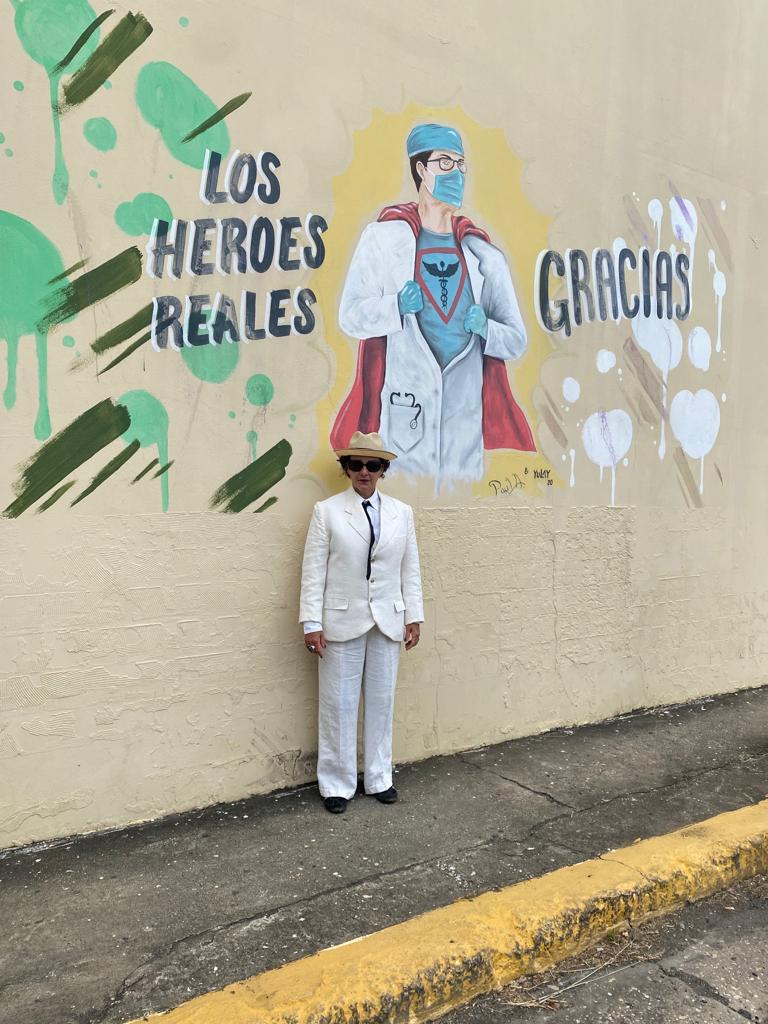
Los héroes reales (The Real Heroes). Arecibo, PR. April 2022. Copyright Teresa Hernández. All rights reserved.
Luisa Capetillo, cuchillo en boca was conceptualized as a live walk, with “stations” to stop and listen to Capetillo’s words, starting from Arecibo’s malecón, crossing the street where the Logia Tanamá and the abandoned Teatro Oliver are located, traversing the public square, and finalizing in front of the Instituto del Karso de Puerto Rico y el Caribe. The latter, alongside a Natural History Museum, will be housed in a closed school that the grassroots organization Ciudadanos del Karso has reclaimed. Capetillo was to be accompanied by two anonymous women with knives between their teeth –played by Teresa Peña Jordán and myself– and by the public who made it to the walk.
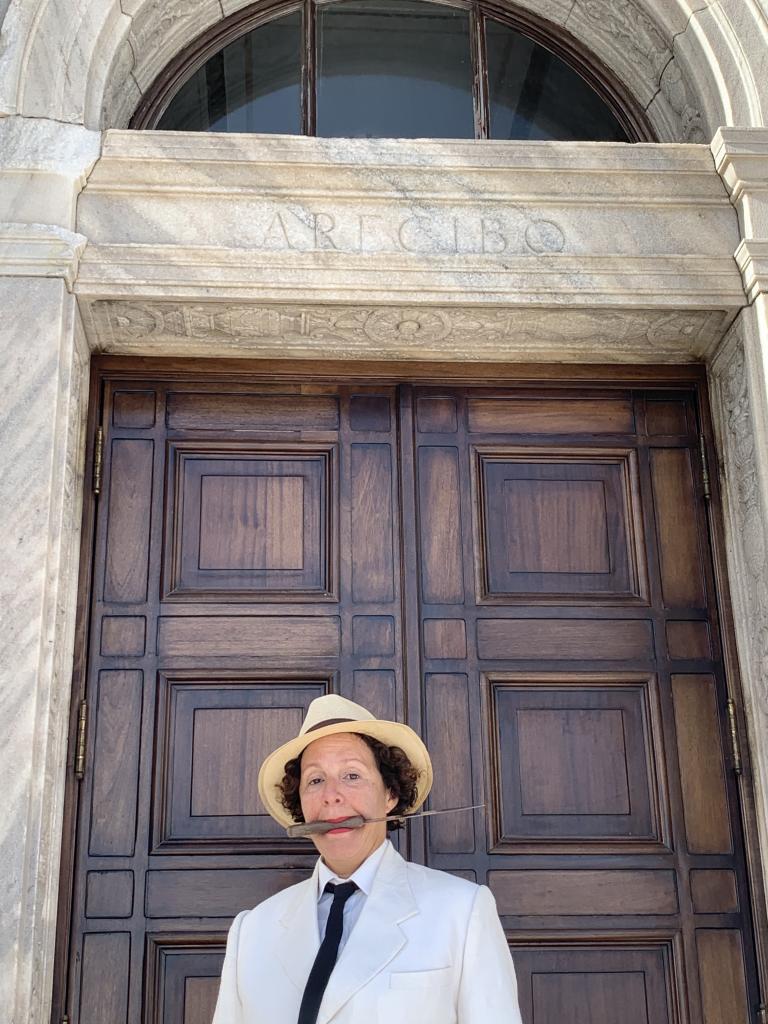
At the Arecibo Door. Capitolio, North Wing, San Juan, PR. Photo by Marisol Plard Narváez. July-August 2021. Copyright Teresa Hernández and Marisol Plard Narváez. All rights reserved.
On April 30, 2022, the day the piece was to be performed as part of the launch in Capetillo’s hometown of the new edition of Amor y anarquía: escritos de Luisa Capetillo (ed. Julio Ramos, Editora Educación Emergente, 2022), a looming threat of thunderous rain was upon us. Taking on the risks involved in pursuing the outdoor event was impossible. And so, the improvisatory quality of life in the colony took over. But this improvisation, as is the case with all rigorously artistic and creative improvisations, led to our collective forging, inside the ruinous building, of a new time and space. We kept the seeds intact: costume, action, image, word, the artist. But we translated them to another, apparently barren, land made of cement. The cold, hard, overbearing surfaces turned out to be full of spirits, yielding an uncanny, incontestable aliveness. By going back to Capetillo’s own words in a building “of before,” which is now a promise of an after, other time to come in a set of islands seemingly without future, Luisa Capetillo, cuchillo en boca became a compelling ritual, at once a cleansing and a prophecy. As we already have, we shall, again, overcome.
It never rained. The next morning, on the 1st of May, International Workers’ Day, an unprecedented tornado hit Arecibo’s waters. It was only natural...
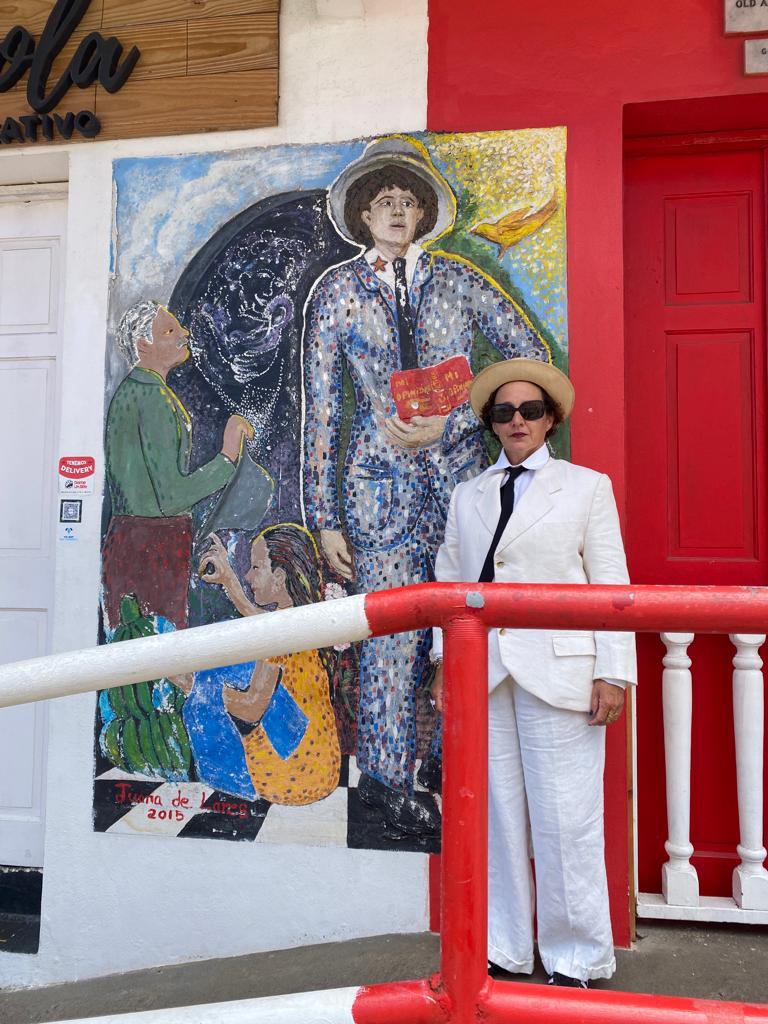
Luisa Squared. Arecibo, PR. April 2022. Copyright Teresa Hernández. All rights reserved.
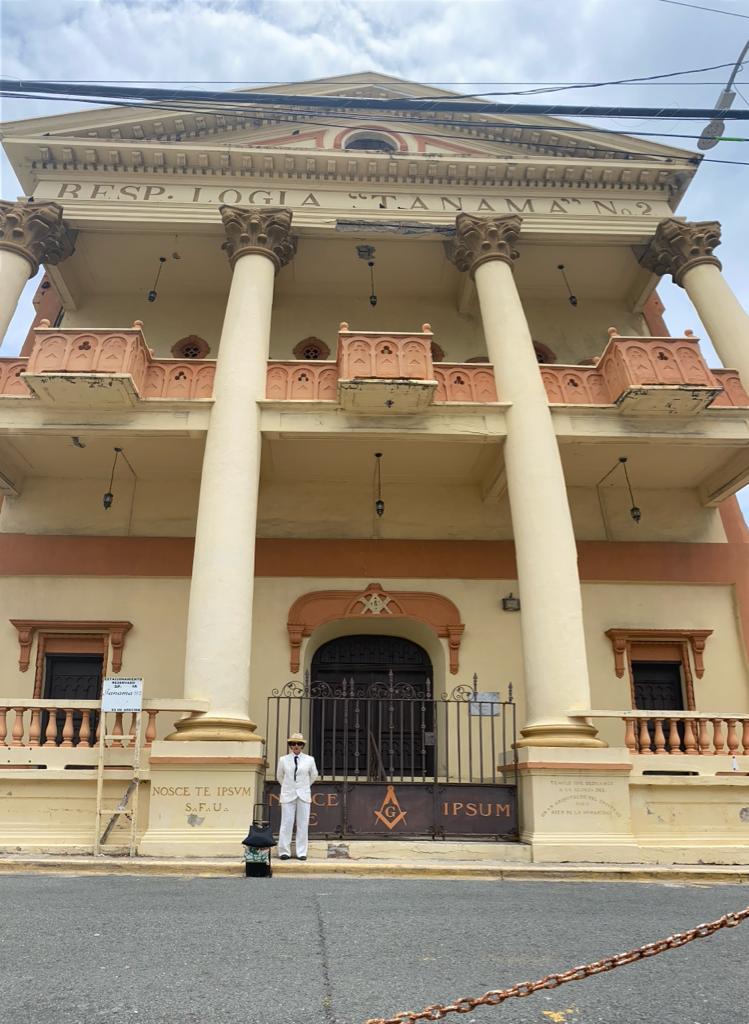
At the Tanamá Masonic Lodge. Arecibo, PR. April 2022. Copyright Teresa Hernández and Marisol Plard Naváez. All rights reserved.
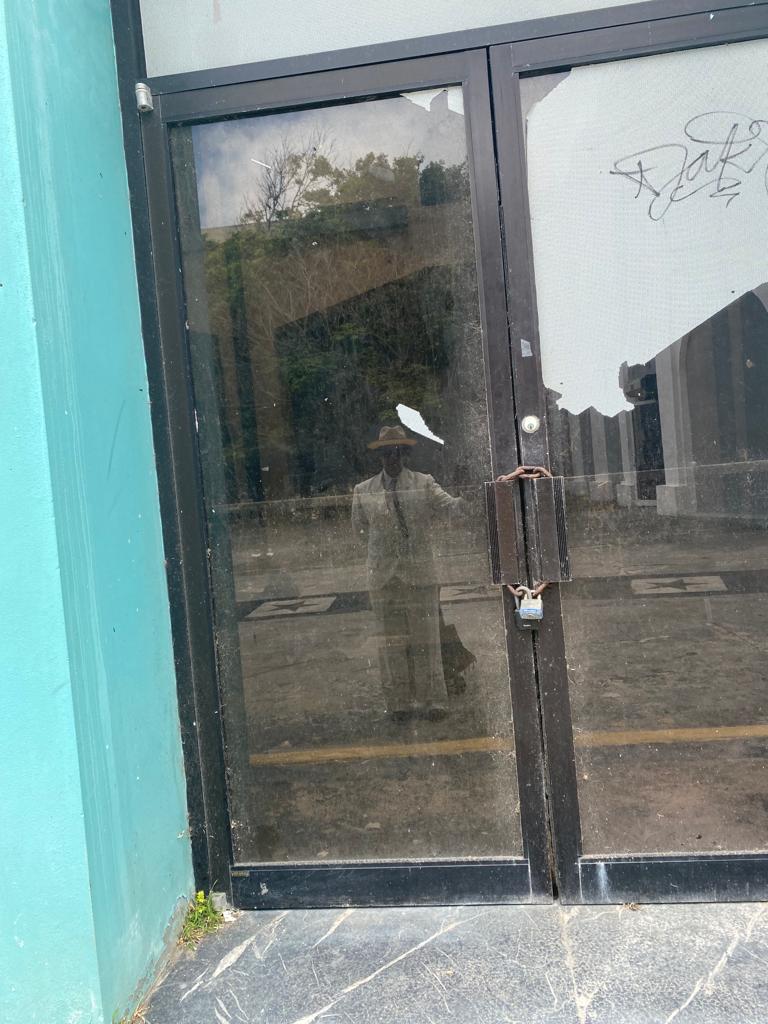
At the Abandoned Oliver Theater's Entrance. Arecibo, PR. Photo by Teresa Hernández. April 2022. Copyright Teresa Hernández. All rights reserved.
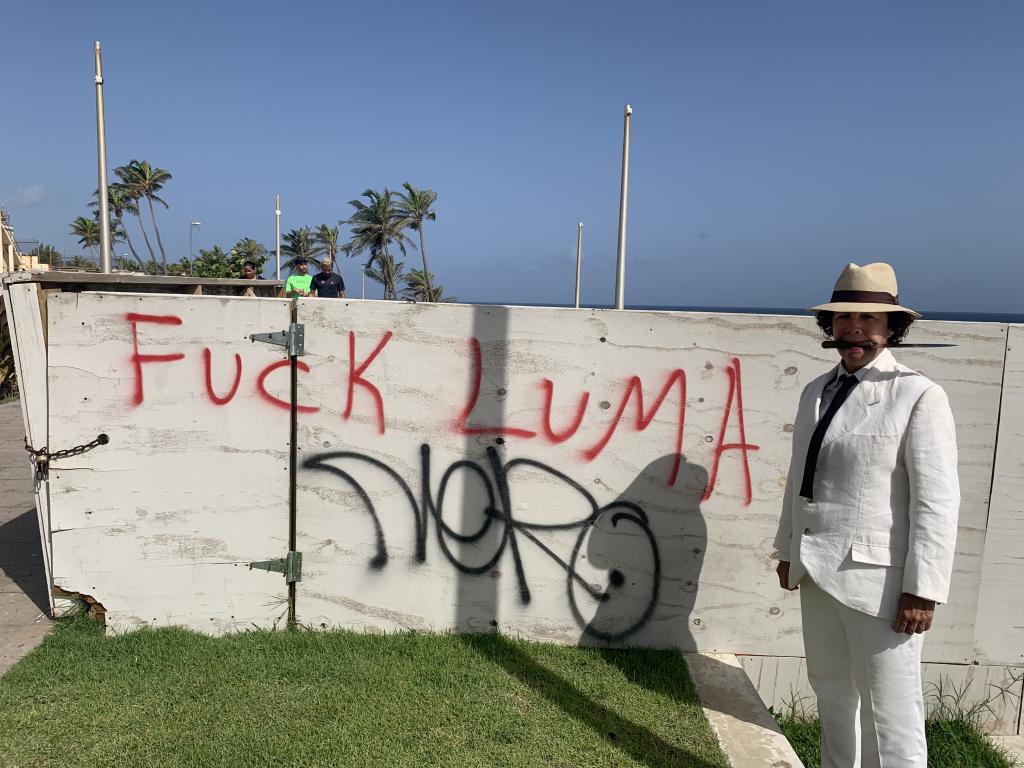
Fuck LUMA. San Juan, PR. Photo by Marisol Plard Narváez. July-August 2021. Copyright Teresa Hernández and Marisol Plard Narváez. All rights reserved.
Sobre Luisa Capetillo, cuchillo en boca: limpieza y profecía
Beatriz Llenín Figueroa
Un vestuario icónico: el pantalón y la chaqueta de hilo, la corbata angosta y el sombrero Panamá de Luisa Capetillo.
Una acción icónica: caminar.
Una imagen icónica: mujer con el cuchillo en la boca.
Una palabra icónica: la de Luisa Capetillo.
Y la artista escénica transdisciplinaria y puertorriqueña, Teresa Hernández.
Tales eran las semillas de la pieza performática, Luisa Capetillo, cuchillo en boca, que Teresa y yo habíamos compartido en exultante anticipación. Hemos sostenido, por algún tiempo ya, diálogos y colaboraciones en torno a inquietudes, pasiones, obsesiones, deseos, pavores comunes: los devenires puertorriqueños y caribeños en la era de la crisis climática, del alza en el nivel del mar, de las erosiones y desposesiones costeras (y de otros tipos); la violencia de género y el persistente abuso contra cuerpos, memorias y trabajos (re)productivos de mujeres y cuerpos feminizados; las cada vez más acorraladas posibilidades de producir y experimentar arte no comercial, y especialmente, artes vivas, en un país colonizado, en odiosa deuda neoliberal, explotado, en ruinas, arruinado por diseño. Como parte de su Bravatas –plataforma artística e investigativa en curso que emergió tras el huracán María en 2017–, Teresa ha estado produciendo trabajos transdisciplinarios (performance, teatro, danza, vídeo) concernidos con tales asuntos. En múltiples producciones de Bravatas, una mujer obrera con el cuchillo en la boca ha sido constante presencia –concepto que ella prefiere al de “personaje”–, y esta mujer obrera, entre otras acciones, camina. Sabemos de la importancia global, transhistórica, del caminar como acción política, como encarnación de una robusta oposición al poder. Más aún, en un pequeño país absurdamente sitiado por el carro como parte del “pacto” colonial que asegura una economía dependiente, de servicio y consumo –y ahora en bancarrota–, y en donde se registran a diario tasas alarmantes de violencia contra cuerpos de mujeres, feminizades y cuir, una mujer que camina a pecho abierto constituye, necesariamente, una aparición rebelde. Transferir el cuchillo de la boca de la obrera anónima a la de Luisa Capetillo, la anarquista, feminista, sindicalista, tabaquera, periodista, escritora, agitadora política, espiritista y revolucionaria general de comienzos de siglo XX, nacida en Arecibo, Puerto Rico, supuso, a la vez, que Bravatas se enraizara históricamente de manera más acentuada, y que Capetillo fuera traducida, su pensamiento y su acción actualizados, al presente, cien años después.
Luisa Capetillo, cuchillo en boca fue conceptualizada como una caminata en vivo, con “estaciones” para detenerse y escuchar las palabras de Capetillo, comenzando en el malecón de Arecibo y continuando a través de la calle en la que ubican la Logia Tanamá y el abandonado Teatro Oliver, cruzando la plaza pública, y finalizando frente al Instituto del Karso de Puerto Rico y el Caribe. Este último, junto a un Museo de Historia Natural, abrirán en una escuela cerrada que Ciudadanos del Karso, organización ecologista de base comunitaria y ciudadana, ha reclamado. Capetillo estaría acompañada por dos mujeres anónimas con cuchillos en boca –representadas por Teresa Peña Jordán y quien escribe– y por el público que llegara al evento.
El 30 de abril de 2022, día en que la pieza se escenificaría como parte del lanzamiento en la ciudad natal de Capetillo de la nueva edición de Amor y anarquía: escritos de Luisa Capetillo (ed. Julio Ramos, Editora Educación Emergente, 2022), planeaba sobre nosotres una acechante amenaza de lluvia copiosa. Con nuestros escasos recursos, resultaba imposible asumir los riesgos asociados, tanto para la artista como para el público, de insistir en un evento al aire libre. Y así, se impuso otra vez la improvisatoria cualidad de la vida en la colonia. Pero ésta, como es el caso con toda improvisación rigurosamente artística y creativa, nos condujo a la producción colectiva, al interior del edificio en ruinas, de un nuevo tiempo y espacio. Mantuvimos las semillas intactas: vestuario, acción, imagen, palabra, la artista. Pero las tradujimos a otra, aparentemente yerma, tierra hecha de cemento. Las superficies frías, duras, sofocantes resultaron rebosantes de espíritus, ofreciéndonos una viveza inquietante, indiscutible. Al retornar a las palabras de Capetillo en un edificio “de antes,” que es ahora una promesa de después, de un tiempo otro, por venir, en un conjunto de islas aparentemente sin futuro, Luisa Capetillo, cuchillo en boca se volvió un poderoso, cautivador ritual, a la vez limpieza y profecía. Del mismo modo en que ya hemos vencido –mirémonos aquí, ahora, estamos, seguimos–, venceremos, otra vez.
Ese día nunca llovió. En la mañana siguiente, el 1ro de mayo, Día Internacional de les Trabajadores, un tornado sin precedentes azotó aguas arecibeñas. Resultó lógico. Natural. De esperarse…
Translations for Small Axe 65, July 2021 are now available!
Translations for Small Axe 65, July 2021 are now available!
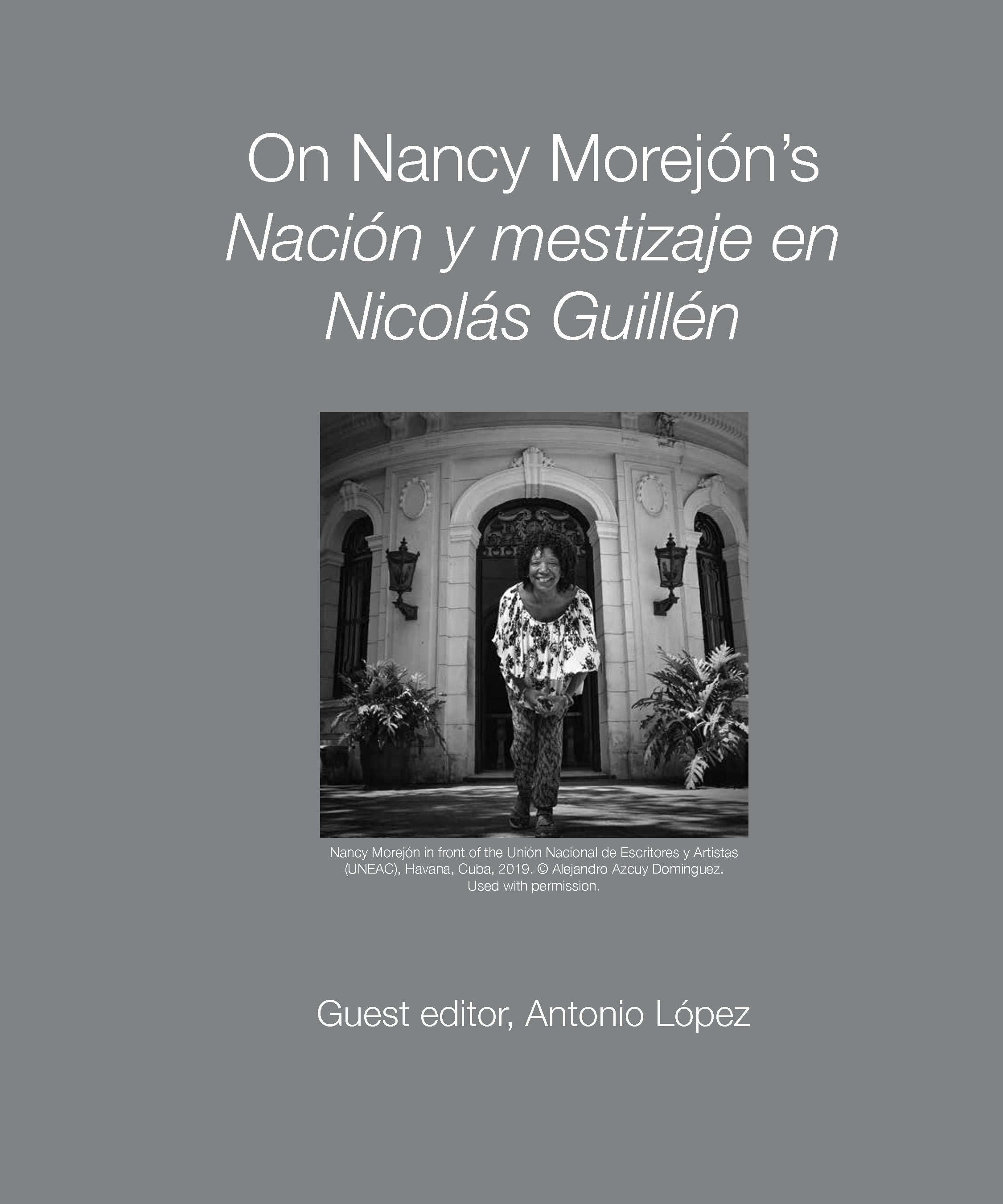
Small Axe 65, July 2021 features a special section titled “On Nancy Morejón’s Nación y mestizaje en Nicolás Guillén,” guest-edited by sx editorial committee member Antonio López. Two of the contributions to this dossier were published in Spanish. Translations from the Spanish into English are now available on the Small Axe website. Read the complete dossier by following the links below.
On Nancy Morejón’s Nación y mestizaje en Nicolás Guillén
Guest editor, Antonio López
Introduction: Literature and the State in Nancy Morejón
Antonio López
Redefining Mestizaje: How Trans-Caribbean Exchanges Solidified Black Consciousness in Cuba
Devyn Spence Benson
Nancy Morejón, Nicolás Guillén, y el cimarronaje aún necesario en Cuba contemporánea
Odette Casamayor-Cisneros
Nancy Morejón, Nicolás Guillén, and the Still-Necessary Marronage in Contemporary Cuba
English translation
Nation, Race, and Performance in the Poetics of Nicolás Guillén and Nancy Morejón
Aisha Z. Cort
Mas yo resto: Una entrevista con Nancy Morejón
Vanessa Pérez-Rosario
But I Remain: An Interview with Nancy Morejón
English Translation
Régine Michelle Jean-Charles' newest book is out: Looking for Other Words: Black Feminism and Haitian Fiction (2022)
Régine Michelle Jean-Charles' newest book is out: Looking for Other Words: Black Feminism and Haitian Fiction (2022)
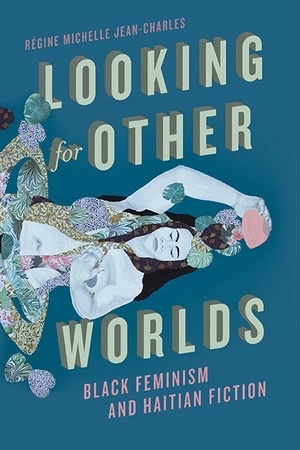
Small Axe editorial committee member Régine Michelle Jean-Charles has a new book out this month! We asked her to tell us a bit about this project. Read what she has to say about her latest book:
My third book, Looking for Other Words: Black Feminism and Haitian Fiction (2022) stems from my longstanding commitment to two related fields—Black feminist studies and Haitian literary studies—and was published this month by University of Virginia Press. This book explores the “ethical imagination” of three contemporary Haitian authors—Yanick Lahens, Kettly Mars, and Évelyne Trouillot—to argue that ethics and aesthetics operate in relation to one another in each of the novels under consideration and that the turn to ethics is essential in reading 21st-century Haitian literature. My intervention situates Lahens, Trouillot, and Mars within a longer tradition of Black feminist writing that is both specific to Haiti and globally relevant. As such, I engage and incorporate the work of thinkers like Paulette Poujol-Oriol, Carolle Charles, Gina Athéna Ulysse, Edwidge Danticat, and Sabine Lamour all of whom have made unique contributions to Haitian feminist studies. Throughout the book, I also consider how popular culture, visual culture, and contemporary feminist organizing in Haiti offer unique points of entry into understanding feminism in the Haitian context. To this end, the activism of Pascale Solages, the art of Tessa Mars, and the photography of Régine Romain all play a role in my inquiry and determination to gather and create a rasanblaj, to use to words of Ulysse, of diverse Haitian feminist creatives.
The Trumpet of Conscience Today (Orbis Press, 2021)
Conflict Bodies: The Politics of Rape Representation in the Francophone Imaginary (Ohio State University Press, 2014)
Caribbean Borderlands: Postnationalism Prefigured @20
Caribbean Borderlands: Postnationalism Prefigured @20
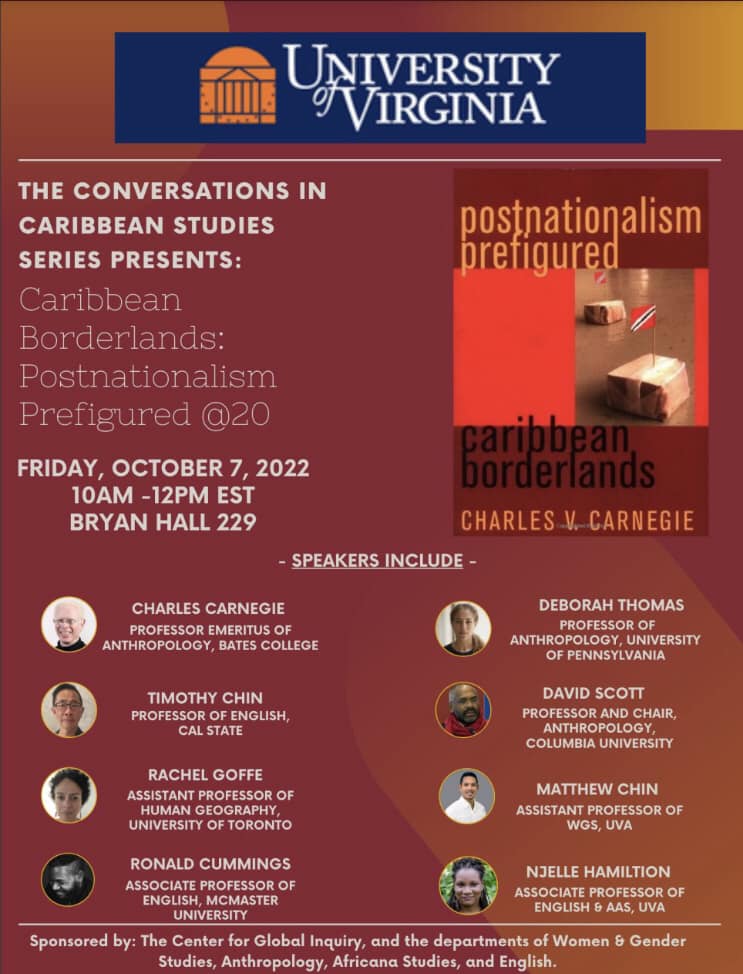
As a part of the Conversations in Caribbean Studies series, this event is organized to celebrate the book Caribbean Borderlands: Postnationalism Prefigured by sx editorial committee member Charles Carnegie, which was published 20 years ago.
Speakers will include Charles Carnegie, Timothy Chin, Rachel Goffe, Ronald Cummings, Deborah Thomas, David Scott, Matthew Chin, as well as Njelle Hamilton. This event is sponsored by the Center for Global Inquiry as well as the departments of Women and Gender studies, Anthropology, Africana Studies, and English at the University of Virginia.
When: October 7, 2022
10AM-12PM EST
Where: Bryan Hall 229, University of Virginia
For those interested in attending virtually via zoom webinar, here is the link:
https://virginia.zoom.us/.../WN_LtY-3Oy9Qz2GekolBnnjxQ